Navigating crypto is made more difficult for those with religious considerations and the founder of an Islamic law compliant DeFi platform has thousands of users seeking approved cryptocurrencies.
Australian-based crypto platform Marhaba DeFi says there has been a strong take-up of Halal-approved cryptocurrency products on its platform, with aims to release a suite of new products which align with Islamic law by the end of 2022.
Launched in 2020, the platform is focused on adhering to the rules of “Islamic finance” which refers to how businesses and individuals raise capital in accordance with Sharia, or Islamic law.
Speaking to Cointelegraph, Marhaba DeFi founder and CEO Naquib Mohammed said active users of their noncustodial multichain Sahal Wallet have grown to around 40,000 since its launch, stating:
“You just download a wallet, and it will give you everything that’s halal in the crypto ecosystem,” he adds.
Marhaba, meaning “welcome” in Arabic, also has four more Islamic law-aligned crypto products releasing this year, something Mohammed says will be an “end-to-end halal ecosystem” for those excluded from the market due to the lack of Sharia compliance.
The first is TijarX, which he says is the first halal decentralized exchange (DEX) for commodity-backed tokens, a halal DeFi staking solution, a liquidity harvesting platform, and a new version of its existing halal nonfungible token (NFT) marketplace:
The first cryptocurrencies launching this month on the TijarX DEX will be tokenized silver and gold backed by real and audited bullion reserves. Mohammed says there’s more to be added to the platform such as tokenized wheat, barley, soya and cocoa.
Mohammed says discussions are already underway but nothing is added to the platform without a vetting process which ensures not only that the provider has enough liquidity to handle the volume but also is complying with Islamic laws:
It’s this process that meant its M.I.R.O. staking platform took eight months to build “because of the difficulty of addressing the Shariah compliance within the space.”
The staking platform is based on the Islamic concept of Ju’ala, something Mohammed describes as “rewards for working.” Users earn a “commission,” part of a share of the platforms’ revenue for doing work within the platform such as participating in governance and voting on proposals.
Marhaba’s liquidity harvester works on a separate Islamic financial profit and loss sharing arrangement called Mudarabah, where one party provides the capital while the other provides labor and both share in the profits and loss.
Mohammed explains charging or earning interest in Islam is considered exploitative, and the liquidity harvester will be a “game changer” for those barred from accepting interest due to their beliefs as they’ll gain exposure to a similar style of product.
Related: NFT and Islamic education: A new frontier to teach religion?
Marhaba is also providing solutions for Islamic businesses using NFTs while the second version of its NFT marketplace will be tailored to businesses, Mohammed revealed it’s already partnered with five organizations that will be utilizing NFTs.
In April, Marhaba issued the first NFT Halal certification and Mohammed expressed this was an area he wants to personally ensure finds usability and adoption, as it will give consumers greater transparency over the validity of a business’ Halal certification:
“We were appreciated greatly within the community for that,” he added.
TijarX is set to go live on Sept. 27, with the revamped NFT market set for late October. M.I.R.O. and the Liquidity Harvester are slated for the first weeks of November and December, respectively.
Author
Administraroot


